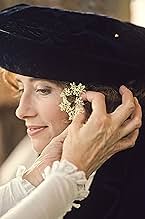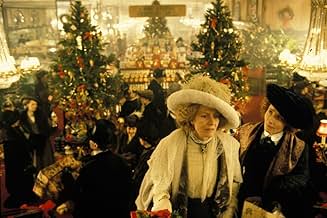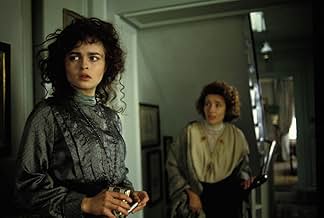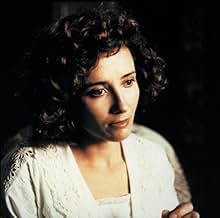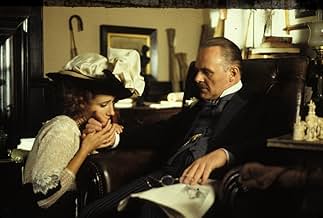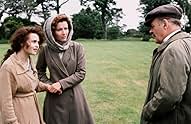PUNTUACIÓN EN IMDb
7,4/10
38 mil
TU PUNTUACIÓN
Un hombre de negocios intenta frustrar los intentos de su esposa de donar parte de su propio legado a otra mujer de clase más baja.Un hombre de negocios intenta frustrar los intentos de su esposa de donar parte de su propio legado a otra mujer de clase más baja.Un hombre de negocios intenta frustrar los intentos de su esposa de donar parte de su propio legado a otra mujer de clase más baja.
- Dirección
- Guión
- Reparto principal
- Ganó 3 premios Óscar
- 32 premios y 49 nominaciones en total
Reseñas destacadas
10sphinx-7
This is one of my all-time favorite movies. From the opening credits, superimposed over Vanessa Redgrave's skirt sweeping through the wet grass and flowers around Mrs. Wilcox's beloved Howards End, through to the final image of rural bliss, the cinematography is perfection. The costuming is amazing, the screenplay is adept, and the acting is stellar, to say the least. To have Emma Thompson, Helena Bonham Carter, Vanessa Redgrave, and Anthony Hopkins in one movie together is to see a true synthesis of talent, not to mention James Wilby and Samuel West. The scene where Leonard Bast goes walking into the field of blue flowers is breathtaking.
I recommend this film to anyone who loves Forster and who loves painterly cinematography. Also it is full of the finest performances by all of the actors involved.
I recommend this film to anyone who loves Forster and who loves painterly cinematography. Also it is full of the finest performances by all of the actors involved.
Being a man who appreciates beauty and great visual movies, I have checked out all the Merchant-Ivory films. I found this to be their prettiest, just stunning in its beauty.
Story-wise, I preferred "The Remains Of The Day," but this was okay. It just didn't have the appealing characters "Remains" had and it was a little too soap opera for my tastes but the visuals made up for that, ...and the story, to be fair, was solid and involving.
It also had Anthony Hopkins and Emma Thompson, and those two make a great pair. I would never get tired of watching either of these great actors, especially when they are together.
If you like period pieces - this is 1910 Edwardian England - along with fabulous sets and scenery, a solid cast, and an involving story, you'll like this. If you are a fan of melodramas then you'll really, really like this!
Story-wise, I preferred "The Remains Of The Day," but this was okay. It just didn't have the appealing characters "Remains" had and it was a little too soap opera for my tastes but the visuals made up for that, ...and the story, to be fair, was solid and involving.
It also had Anthony Hopkins and Emma Thompson, and those two make a great pair. I would never get tired of watching either of these great actors, especially when they are together.
If you like period pieces - this is 1910 Edwardian England - along with fabulous sets and scenery, a solid cast, and an involving story, you'll like this. If you are a fan of melodramas then you'll really, really like this!
For those who want to watch an intelligent, lovely-to-look-at motion picture, it doesn't get much better than this. The film tells the story of two sisters, of limited but respectable means, who collide with the world of the very rich in Edwardian England. One sister benefits from the acquaintance with the wealthy Wilcoxes. The other is all but destroyed by it. Along the way, there are charming scenes of tea parties and music classes, elegant costumes, fantastic settings, and engaging conversations. There is also a sad, secondary storyline of a poor clerk and his wife who, unfortunately, slip into even more abysmal circumstances through no fault of their own. The ending is tinged with despair, even as it offers some hope for both of the sisters' futures. The film should be commended as well for the fine performances of Emma Thompson, Anthony Hopkins, Helena Bonham-Carter and others. Any discriminating film enthusiast will not want to miss this movie.
...and I must admit that on the first viewing, I didn't get it myself.
I'm one of those relative rarities: a straight male that normally enjoys Merchant-Ivory productions. However, I disliked this movie on first viewing (several years ago). In retrospect, I can see that I was not reacting to the movie, but my intense dislike for Anthony Hopkins' character.
I watched it again the other night and was absolutely blown away by it. What a film! Emma Thompson won Best Actress for her performance, and she did her usual terrific job, but frankly I was more impressed by the performance of Helena Bonham Carter. The style of the film is magnificent.
This is a story (like most of E. M. Forster's) about the injustices of class distinctions. However, with a subtlety that I missed on my first viewing, this film is also about karma (what goes around - comes around) and a story of social progress. This film is set in a time when society is coming out of the Victorian age and into the Edwardian. You see contrasts of the past thinking with the progressive thinking all through the movie. A visual metaphor is repeated over and over: the turning of cranks, whether it be on a new-fangled morse code machine, a vintage car, or the wheels of a mighty locomotive. I believe that this represents both karma and progress, forces which Forster sees as unstoppable as the laws of nature.
This is an incredible story, and an incredible piece of film-making.
I'm one of those relative rarities: a straight male that normally enjoys Merchant-Ivory productions. However, I disliked this movie on first viewing (several years ago). In retrospect, I can see that I was not reacting to the movie, but my intense dislike for Anthony Hopkins' character.
I watched it again the other night and was absolutely blown away by it. What a film! Emma Thompson won Best Actress for her performance, and she did her usual terrific job, but frankly I was more impressed by the performance of Helena Bonham Carter. The style of the film is magnificent.
This is a story (like most of E. M. Forster's) about the injustices of class distinctions. However, with a subtlety that I missed on my first viewing, this film is also about karma (what goes around - comes around) and a story of social progress. This film is set in a time when society is coming out of the Victorian age and into the Edwardian. You see contrasts of the past thinking with the progressive thinking all through the movie. A visual metaphor is repeated over and over: the turning of cranks, whether it be on a new-fangled morse code machine, a vintage car, or the wheels of a mighty locomotive. I believe that this represents both karma and progress, forces which Forster sees as unstoppable as the laws of nature.
This is an incredible story, and an incredible piece of film-making.
Here is another example of what the British are best at in film-making. Based on E.M. Forster's novel `Return to Howards End' this film is more or less a set piece in the strictest period-piece tradition, and thus in style is somewhat akin to that great TV series `Return to Brideshead' and even Robert Altman came up trumps with his splendid `Gosford Park' which most definitely takes its well-earned place alongside such classical pieces of this genre.
Likewise, `Howards End' relies heavily on British actors who have worked their way up through live theatre: it is here that you get the best interpretations, the best performances, admirably shown in so many films made on both sides of the Atlantic. If Vanessa Redgrave has long since been a legend among British actresses, Emma Thompson is no lesser performer, and as to the pedigree of Helena Bonham-Carter there can be no arguing. Anthony Hopkins is at least up to the mark in his always sober readings in these kinds of films.
The Bonham-Carter family were well known in the fashionable circles of 1930's London high-society life, for their extravagant soirées and philanthropic sponsoring of young artists, especially musicians, similarly to the Sitwell family from their Chelsea home. Thus it is hardly surprising that Helena Bonham-Carter finds these kinds of rôles admirably suited to her - A Room with a View, anything Shakespearean, among other select `comedies'. Prunella Scales is a grand old lady of theatre, cinema and television, and I can remember her offerings back in the late fifties-early sixties especially on radio programmes.
Beautifully filmed in mostly Oxfordshire and in several places in London, the film also has a few scenes on the coast, possibly Dorsetshire or more probably the south coast of Devon, surprisingly not included in IMDb's very detailed listing of locations. Richard Robbins' music seemed to be heavily influenced by Philip Glass at times, which seemed a misfit, though it was nice to hear a few snatches by Percy Grainger, as well as a version for four hands on the piano of Beethoven's Fifth Symphony, possibly one of those tremendous transcriptions which Franz Liszt carried out.
The dialogues are mostly exquisitely delivered, with that peculiarly British panache and timing, though slightly spoiled in this recent re-viewing as there were some untimely cuts on the copy in question. However, the story holds its line and is faithful to E.M. Forster's original concept. He has long been one of the greatest of British novelists, with such works as `A Passage to India', `Where Angels Fear to Tread' and `A Room with a View' to his credit, for serious readers of real literature.
This film version maintains that seriousness for people interested in real play-acting.
Likewise, `Howards End' relies heavily on British actors who have worked their way up through live theatre: it is here that you get the best interpretations, the best performances, admirably shown in so many films made on both sides of the Atlantic. If Vanessa Redgrave has long since been a legend among British actresses, Emma Thompson is no lesser performer, and as to the pedigree of Helena Bonham-Carter there can be no arguing. Anthony Hopkins is at least up to the mark in his always sober readings in these kinds of films.
The Bonham-Carter family were well known in the fashionable circles of 1930's London high-society life, for their extravagant soirées and philanthropic sponsoring of young artists, especially musicians, similarly to the Sitwell family from their Chelsea home. Thus it is hardly surprising that Helena Bonham-Carter finds these kinds of rôles admirably suited to her - A Room with a View, anything Shakespearean, among other select `comedies'. Prunella Scales is a grand old lady of theatre, cinema and television, and I can remember her offerings back in the late fifties-early sixties especially on radio programmes.
Beautifully filmed in mostly Oxfordshire and in several places in London, the film also has a few scenes on the coast, possibly Dorsetshire or more probably the south coast of Devon, surprisingly not included in IMDb's very detailed listing of locations. Richard Robbins' music seemed to be heavily influenced by Philip Glass at times, which seemed a misfit, though it was nice to hear a few snatches by Percy Grainger, as well as a version for four hands on the piano of Beethoven's Fifth Symphony, possibly one of those tremendous transcriptions which Franz Liszt carried out.
The dialogues are mostly exquisitely delivered, with that peculiarly British panache and timing, though slightly spoiled in this recent re-viewing as there were some untimely cuts on the copy in question. However, the story holds its line and is faithful to E.M. Forster's original concept. He has long been one of the greatest of British novelists, with such works as `A Passage to India', `Where Angels Fear to Tread' and `A Room with a View' to his credit, for serious readers of real literature.
This film version maintains that seriousness for people interested in real play-acting.
¿Sabías que...?
- CuriosidadesDame Emma Thompson received a total of thirteen nominations for her role in this movie. She won in all of those events, which includes an Oscar, a Golden Globe, and a BAFTA as Best Actress.
- PifiasWhen Charlie and Dolly Wilcox are hiding from Margaret Schlegel in the castle, the scene closes with low angle wide shot of the castle with a view of the sky behind it, revealing an aircraft contrail. There were no aircraft capable of leaving high-altitude contrails in the time period this movie is set in.
- Citas
Margaret Schlegel: Will you forgive her as you yourself have been forgiven... you have had a mistress; I forgave you. My sister has a lover, you drive her from the house. Why can you not be honest for once in your life? Why can't you say what Helen has done, I have done!
Selecciones populares
Inicia sesión para calificar y añadir a tu lista para recibir recomendaciones personalizadas
- How long is Howards End?Con tecnología de Alexa
Detalles
- Fecha de lanzamiento
- Países de origen
- Sitio oficial
- Idiomas
- Títulos en diferentes países
- Retorn a Howards End
- Localizaciones del rodaje
- Fortnum & Mason's, Piccadilly, Mayfair, Westminster, Greater London, Inglaterra, Reino Unido(where Ruth and Margaret do their Christmas shopping)
- Empresas productoras
- Ver más compañías en los créditos en IMDbPro
Taquilla
- Recaudación en Estados Unidos y Canadá
- 26.126.837 US$
- Fin de semana de estreno en EE. UU. y Canadá
- 52.568 US$
- 15 mar 1992
- Recaudación en todo el mundo
- 26.476.514 US$
- Duración
- 2h 22min(142 min)
- Color
- Relación de aspecto
- 2.39 : 1
Contribuir a esta página
Sugerir un cambio o añadir el contenido que falta




